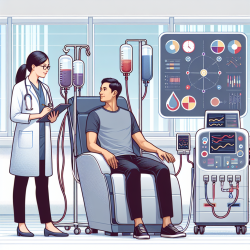The complexity of symptoms experienced by patients undergoing hemodialysis necessitates a comprehensive and collaborative approach to care. The research article titled “You need a team”: perspectives on interdisciplinary symptom management using patient-reported outcome measures in hemodialysis care—a qualitative study provides valuable insights into how patient-reported outcome measures (PROMs) can support interdisciplinary symptom management. This blog post aims to help practitioners improve their skills by implementing the outcomes of this research or by encouraging them to engage in further research.
The Role of PROMs in Interdisciplinary Care
PROMs are standardized instruments that assess patients' perspectives on their health status, including their health-related quality of life, symptoms, functionality, and wellbeing. For patients with kidney failure receiving hemodialysis, integrating PROMs into routine care can help address the high symptom burden and complexity by coordinating the expertise of different care team members.
Integrating Care for Interrelated Symptoms
The study highlights the importance of integrating care for interrelated symptoms through an interdisciplinary approach. Participants noted that PROMs underscored the complexity and interrelatedness of symptoms, which often required input from various healthcare professionals. By using PROMs alongside symptom management tools, practitioners can tackle concerns from different angles, provided they have access to the necessary resources and personnel.
Streamlining Information Sharing and Access
PROMs facilitate streamlined information sharing and access among interdisciplinary team members. The formalized capture of symptom trends enables efficient information exchange and helps establish a central repository of patient-focused data. This accessibility allows for proactive engagement in patient care and enhances communication among team members.
Reshaping Expectations
PROMs also play a crucial role in reshaping expectations for follow-up and managing symptom persistence. The chronic nature of kidney failure means that symptoms often persist despite appropriate treatment. In such cases, PROMs serve as tools to validate patients' concerns, engage the interdisciplinary team in managing expectations, and assist patients in developing coping strategies to live well.
Encouraging Further Research
The findings from this study suggest several areas for further research. Practitioners are encouraged to explore how PROMs can be optimized to meet patients' physical and psychological support needs. Additionally, there is a need to investigate how PROMs can be used to engage community health professionals in symptom management beyond the hemodialysis unit.
Conclusion
Integrating PROMs into routine hemodialysis care highlights symptom interrelatedness and complexity while streamlining the involvement of the interdisciplinary care team. Practitioners can enhance their skills by implementing these findings into practice or engaging in further research to optimize patient-centered care models. By doing so, they can improve patient outcomes and contribute to the advancement of healthcare practices.
To read the original research paper, please follow this link: “You need a team”: perspectives on interdisciplinary symptom management using patient-reported outcome measures in hemodialysis care—a qualitative study.










